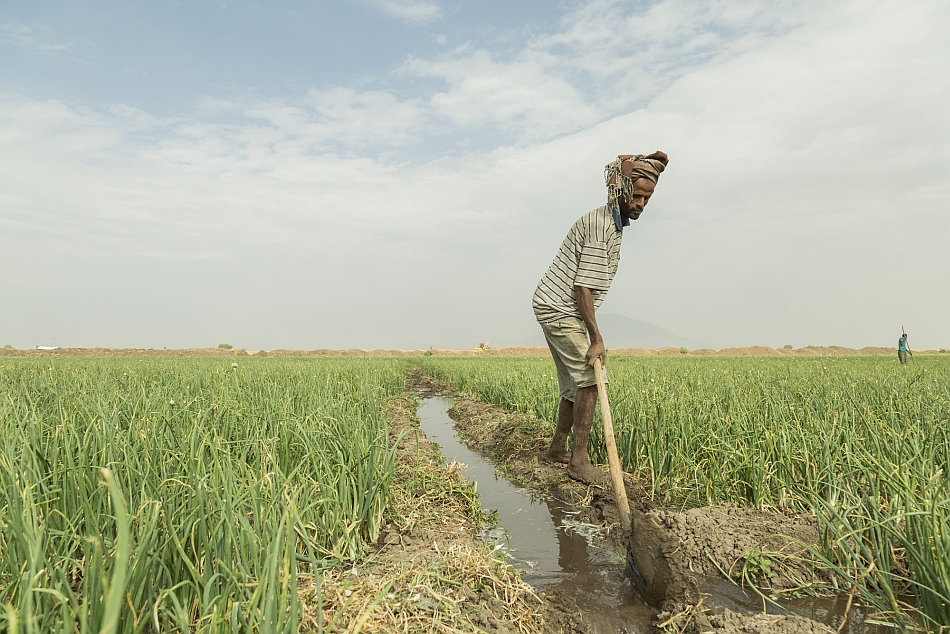By Kashi Kafle, Economist – Impact Evaluation, IWMI

In Ethiopia, development of small-scale private wells initiated and managed by farmers, have gained significant momentum in recent years. This expansion of farmer-led irrigation development (FLID) in the country is primarily guided by land suitability for irrigation, but pays little attention to farmers’ economic status and agricultural practices.
A recent study by the International Water Management Institute (IWMI) found that if investment in FLID is targeted to land areas that are suitable for groundwater-based irrigation, it is wealthier farmers and cash-crop cultivators who benefit and not poor and vulnerable farmers.
Ethiopian agriculture employs more than 70 percent of the population and contributes about 40 percent to the national GDP. But farming here has long been crippled with low productivity. Lack of irrigation is one of the major reasons for low agricultural productivity; only about 9 percent of the country’s arable land is irrigated. Other reasons for low agricultural productivity include lack of credit, fertilizer unavailability, poor market access, and climate shocks (e.g. droughts). Low productivity has significantly contributed to widespread poverty and food insecurity. In 2019, more than 27 percent of the population was severely food insecure..
In the event of droughts, irrigation can minimize the risk of crop loss, and thus, income for small scale farmers. For example, solar-powered irrigation can help reduce the impact of drought as well as reducing greenhouse gas emissions from agriculture. The Ethiopian government considers irrigated agriculture to be one of the main ways to reduce poverty and food insecurity. Specifically, under the Growth and Transformation Plan II and a recently approved 10-year development plan, expansion of farmer-led irrigation development has been made a priority.
A study published in the Journal of Development Studies by IWMI researchers employs a unique approach by combining spatial irrigation suitability data with socio-economic data. It combines spatial information on land suitability for groundwater-based irrigation and solar-powered irrigation in Ethiopia with 2007 census data and 2015/16 integrated household and agricultural data collected by the World Bank’s Living Standard Measurement Study (LSMS) survey.
Results from the study show that land suitable for groundwater-based irrigation is owned by wealthier households. Wealth status is measured with the value of household consumption per person and a multi-dimensional wealth index which includes different types of durable assets owned by the household (e.g. cellphones, cars, refrigerator, farm implements etc.). Specifically, ownership of land that are highly suitable for groundwater-based irrigation is associated with 13% higher consumption expenditure, 25% greater land size, and higher assets. Since the farmers who are more likely to make private investment in FLID are economically better off, public investment in farmer-led irrigation development targeted at reducing up-front investment costs and stimulating agri-businesses will likely benefit wealthier farmers. Less wealthy farmers who lack private resource to initiate FLID expansion may not benefit from public investment in FLID.
The new study found that it is the cash-crop cultivators who are more likely to make private investment in FLID and hence benefit from public support for FLI expansion than cereal farmers. Farmers who own land that is more suitable for groundwater-based irrigation, tend to cultivate more high value crops such as vegetables, fruits, and other cash crops. Farmers who cultivate cereals and legumes tend to own land that is less suitable for groundwater irrigation, and thus FLID. Hence, special consideration is needed on how public investment in farmer-led irrigation expansion can support these cereal producers as they may be at higher risk of crop loss due to climate change.
The findings of the study provide important insights for efforts to expand farmer-led groundwater irrigation (including solar irrigation pumps) in Ethiopia. If farmer-led irrigation development is to be used as an instrument for poverty reduction and food security, it should consider both spatial land suitability for irrigation and farmers’ socio-economic characteristics. There is a need to identify the role and risk of public and private actors providing investments in farmer-led irrigation, primarily with regards to providing tailored financing and equitable access to irrigation for small-scale farmers. These interventions should go hand in hand with strengthening irrigation supply chains, irrigation services, and agricultural markets.

